Did you know that the average egg consumption per person is 250 eggs per year? Eggs are extremely nutritious and are part of a healthy diet.
There are dozens of ways to eat eggs. They can be cooked on their own or used in countless ways from baking to main dishes.
Eggs are perishable, however, and must be stored properly to maximize freshness and delay spoilage. Farm fresh eggs differ from store-bought eggs, thus they can be stored differently.
After reading this post, you will know everything there is to know about how to store eggs and how to tell if eggs are good.
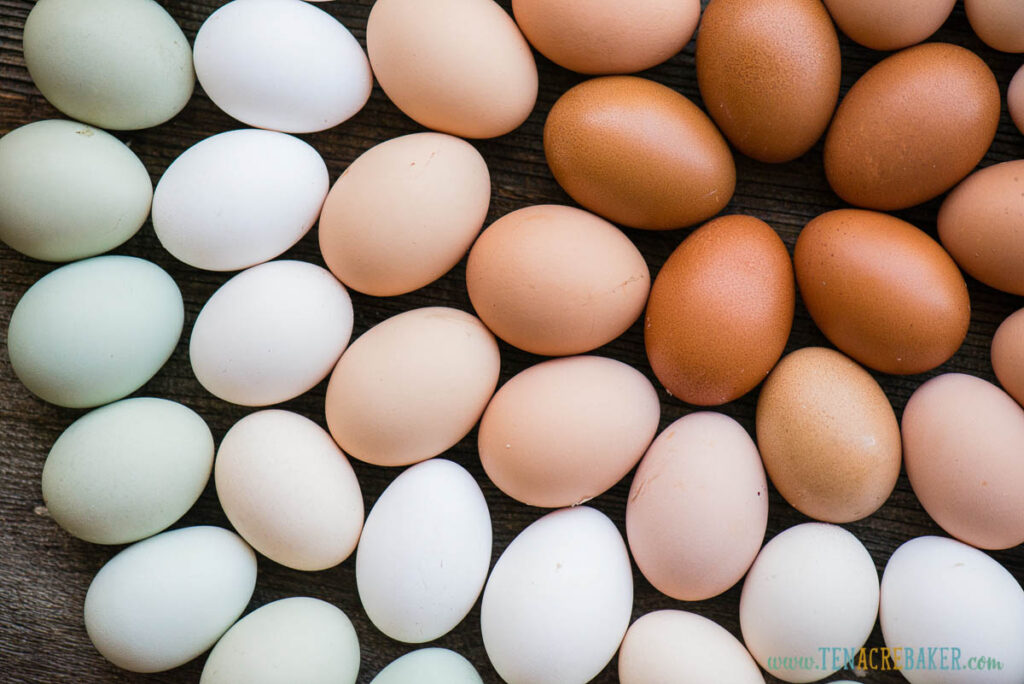
Jump to:
How to Properly Store Eggs
The method in which an egg is stored varies based on the type of egg. Fresh egg storage differs from eggs bought at the grocery store. Storage also differs between whole eggs and cracked eggs. Below is a summary of different options.
How to Store Unwashed Fresh Eggs
A common question is whether eggs can be stored at room temperature on the kitchen counter. The answer is YES, but only if they are unwashed eggs.
When a hen lays an egg, it is covered with a protective layer called the bloom or cuticle. This layer is applied just before it passes through the egg tract. This layer keeps out bacteria as well as air, thus protecting it from spoilage.
These room temperature eggs can be stored in a bowl, an egg carton, or an egg skelter. An egg skelter ensures that older eggs are eaten first. We call this FIFO - first in, first out. To maintain freshness, you will always want to consume the oldest eggs first.
Fun fact: Unwashed fresh eggs last just as long when stored at room temperature as long as a refrigerated store-bought egg!
How to Store Washed Fresh Eggs
It is very tempting to immediately wash dirty eggs.
They are often covered in mud because the hen will move eggs around with her muddy feet. You will often find farm eggs covered in poop. Yes, poop. Occasionally, an egg will break in the nesting box and will make a mess of the other eggs.
Once an egg has been washed, however, it must be refrigerated.
Washing an egg removes the protective bloom. This leaves the egg susceptible to bacteria entering through the permeable shell.
How to Store Commercial Eggs
Because store bought eggs have been cleaned and never have the protective coating intact, they must be and remain refrigerated. Store them in their original carton in the refrigerator until ready to use.
How to Store Raw Eggs
Sometimes it is necessary to store uncooked eggs that have been cracked. For example, if you make a recipe like hollandaise sauce or crème brulee, you will have leftover egg whites. Likewise, if you make an angel food cake or lemon meringue pie, you'll be left with egg yolks.
- To store egg whites, refrigerate in an airtight container and use within 2-4 days. They can also be frozen for up to a year. If frozen, they should only be used for baking once thawed as they will no longer taste as good as fresh egg whites.
- To store raw yolks, cover yolks with a small amount of water and refrigerate in an airtight container. The water is needed to prevent the egg yolks from drying out. Discard water before using. These should also be used within 2-4 days. Freezing egg yolks is not recommended.
Cracked whole eggs can also be refrigerated for 1-2 days in an airtight container.
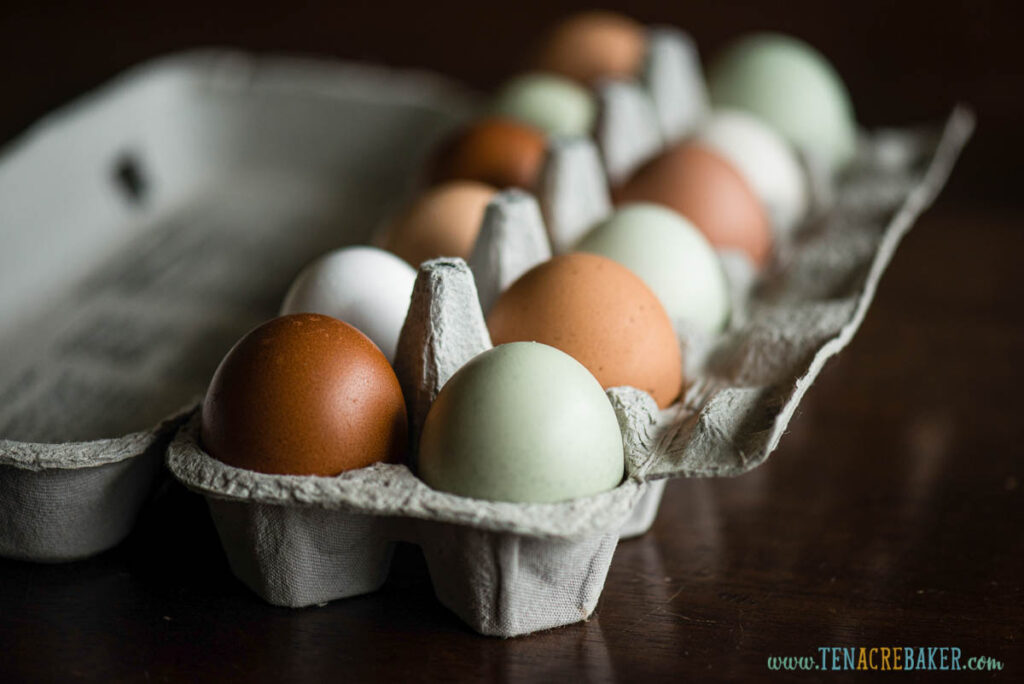
Egg Refrigeration Best Practices
Refrigeration slows the growth of bacteria. It also helps prevent it from penetrating the shell. Refrigeration will keep eggs safe to eat for a long time, but the quality of the egg will slowly continue to deteriorate.
- The best way to store eggs in the refrigerator is in an airtight container in the back of the fridge.
- The airtight sealable container limits the amount of air that can pass through the porous shell. It is more convenient, however, to store them in their carton. The carton also helps protect them from accidentally breaking.
- The reason to store eggs in the back of the fridge instead of the door is to maintain constant cooler temperatures. Ideally, eggs should be stored at a constant temperature of 40°F (4°C) or below.
- If stored on the door, the temperature will vary every time the door is open. If your refrigerator came with an egg dish that fits in the door compartment, don't use it. Use that space to store condiments or canned drinks.
Important: Once an egg is removed from the refrigerator, it should be used within 1-2 hours. This applies to farm fresh or grocery store eggs.
A cold egg warmed to room temperature will "sweat" and be covered in a layer of condensation. This moisture can facilitate the movement of bacteria through the shell.
Bottom line - once you decide to refrigerate an egg, you are committed to keeping it refrigerated until you use it.
Fresh versus Rotten Eggs
A chicken maintains a body temperature of 105°F. That is the temperature at which an egg is laid. When laid, the egg does not have any air in it. As the egg cools to ambient temperature, the liquid egg yolk and white contract and an air pocket forms between the shell and the membrane.
As the egg ages, moisture and carbon dioxide evaporate out through the shell and the air pocket expands. Because of this moisture loss, the air pocket will continue to expand and the egg will dry out. This will affect the quality and freshness of the egg.
- Fresh eggs are best when the entire egg might not be fully cooked. For example, poached eggs or over-easy eggs where the yolks are runny. Likewise, if the raw egg is used in homemade mayonnaise or pasta carbonara, fresh eggs are best.
- Rotten or spoiled eggs should not be eaten, however, old eggs that aren't super fresh still have their uses.
- Older eggs are best used for baking. They will work the same as fresh eggs but the lack of freshness can't be tasted.
It is commonly believed that older eggs are best for hard-boiled eggs. This is because they have a larger air sack inside the egg, thus supposedly making them easier to peel.
I make my hard-boiled eggs, however, with the best quality, most fresh eggs, and they peel easily!
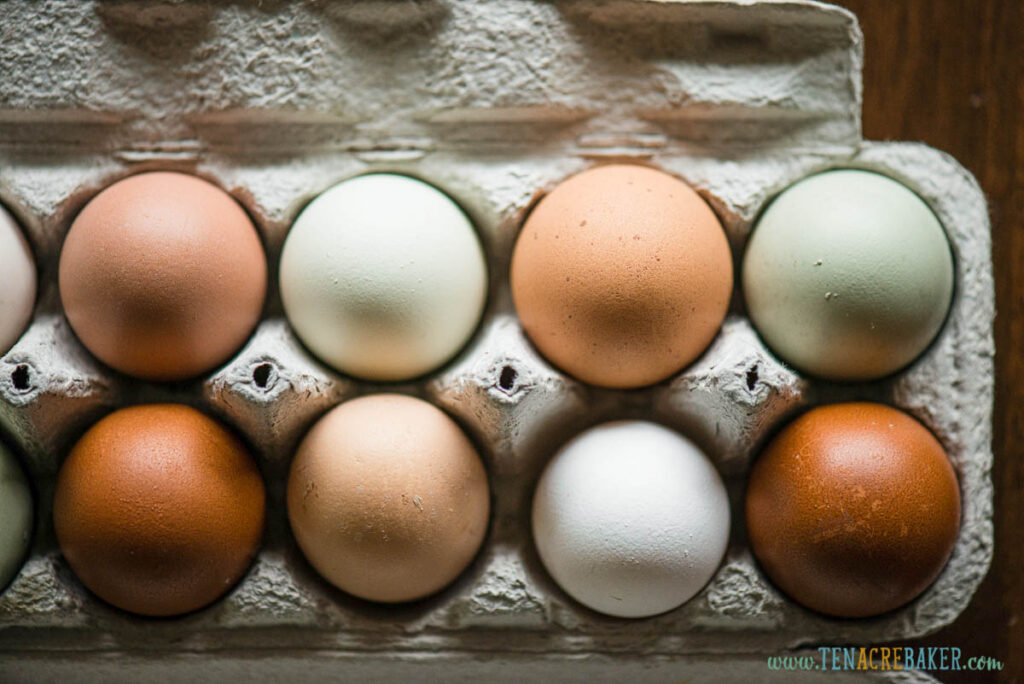
How to Tell if Eggs are Good
There are several ways to identify a bad egg from a good egg. Through a series of easy tests, you can easily determine if you can eat your eggs or they need to be tossed.
Expiration Date
For store bought eggs, if the expiration date has not passed, you have good eggs. Unless the shells have broken, you have nothing to worry about.
If the expiration date has passed, that does not mean you cannot eat the eggs. They just might be past their peak freshness.
Visual Test
Examine the egg shell and look for cracks. When you're at the store, open the egg carton and look for cracks. Do not buy any eggs that have cracked shells. If a store bought egg cracks on the way home, keep it refrigerated and try to use it within a day or two.
The same rule applies to fresh eggs. Whether they are clean eggs or have yet to be washed, once the shell cracks, bacteria can enter the egg. If the shell cracks but the inner membrane is intact, refrigerate the egg and use it within 1-2 days.
Once cracked, you can see if an egg is good. A cloudy white is indicative of a very fresh egg. The color of the yolk can vary from pale yellow to dark orange. This is not an indicator of freshness, but of the hen's diet.
Smell Test
The easiest way to tell if an egg is rotten is if it smells bad. The sniff test is an unmistakable indicator.
Short answer: a spoiled egg will smell putrid and should be disposed of.
Float Test
My daughter actually did a science experiment on how long fresh eggs last. She used the egg float test to gather data.
A fresh egg can be placed in a glass of water or bowl of water. The larger the air sac, the more buoyant the egg becomes.
A fresh egg will have very little air inside the shell and will sink to the bottom. An egg stands upright will have more air inside it's shell. This does not mean the egg is rotten, but it is no longer fresh.
When an egg floats, you may or may not want to use the egg. It is certainly no longer fresh, but it is not necessarily bad.
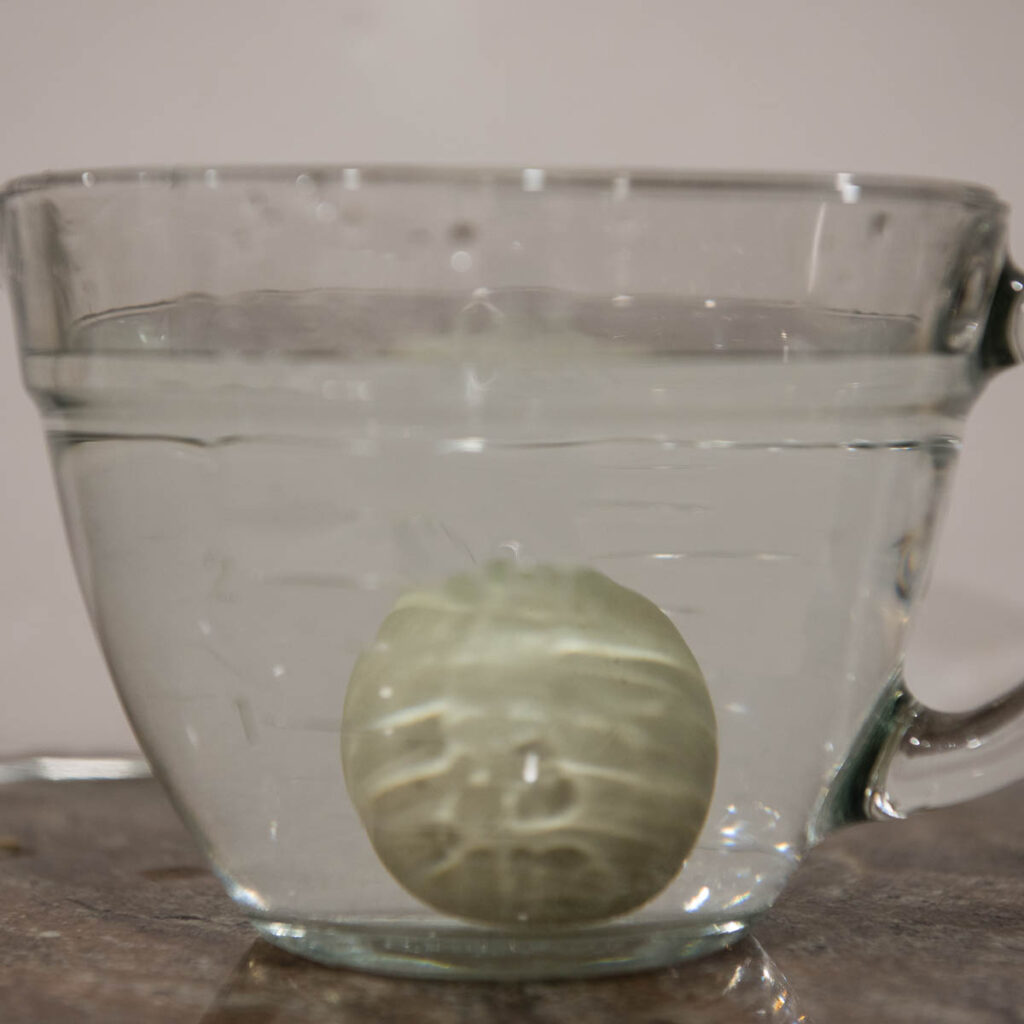
fresh egg sinks 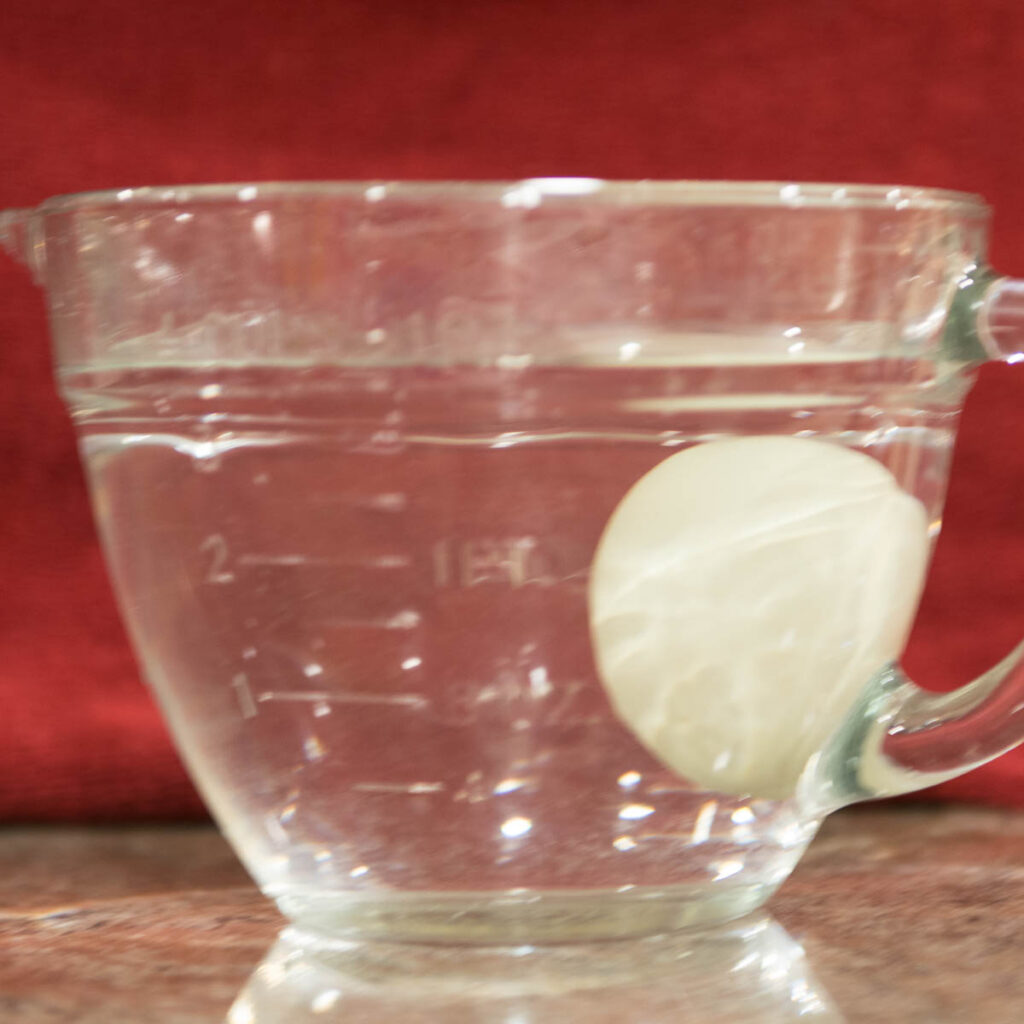
starts to float when losing freshness 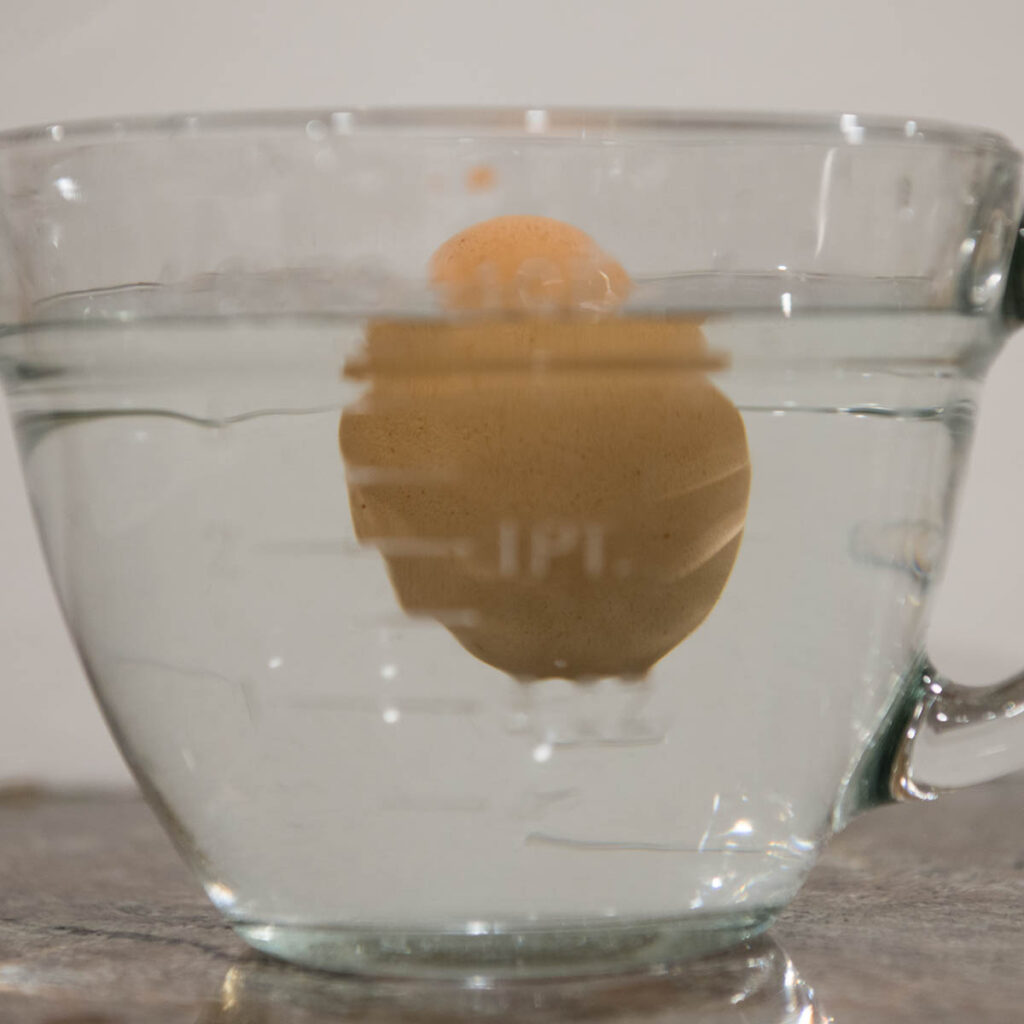
potentially spoiled egg floats
Farm Fresh Eggs vs Store Bought Eggs
Where to get farm-fresh eggs?
If you're lucky enough to own backyard chickens as I do, you are able to enjoy the freshest possible eggs on a daily basis.
If you don't own chickens, you can still get eggs from a local farmer. A farmer’s market will have vendors who sell fresh eggs. They are also commonly found at roadside stands where small farms trust that you will leave money when you take the eggs they have for sale.
Additionally, people like me who have lots of eggs will offer them for sale on Craigslist or on Facebook Market Place.
Store-Bought Egg facts:
Unless you've grown up on a farm and have never eaten in a restaurant, you've eaten grocery store eggs.
In the United States, the Food and Drug Administration requires that these eggs are washed with a chemical sanitizer prior to leaving the facility. They are then kept under constant refrigeration to limit the growth of bacteria.
The benefit of buying eggs from the store is that they are generally consistent in size and quality.
Why local farm eggs are better than commercial eggs:
A freshly laid egg will have superior quality, richer flavor, and better taste. A farm egg can literally be used as soon as it is laid. You can't get any fresher than that.
It is more common for a carton of eggs from the store to be stamped with an expiration date rather than a pack date. Therefore, the actual age of a grocery store egg is unknown.
It is not uncommon for store-bought eggs to be several weeks old by the time you bring them home.
An additional consideration is the welfare of the chickens laying the eggs. Local farmers and people with backyard chickens often provide more space with ample area for them to free range. This also provides for more fresh air and a diverse diet for their hens.
Chickens in commercial facilities are most often cages or given limited space. Additionally, their diets may be supplemented with fillers and even corn syrup!
When to Wash Eggs
If you get fresh farm eggs or backyard chicken eggs, best practices are to request that they are delivered to you unwashed. This is the best way to maximize the shelf life of eggs.
Gently wash the shells with warm water when you are ready to use them. Once washed, they must remain refrigerated since they no longer have their natural coating.
Store bought eggs need not be washed since the shells were already cleaned and sanitized before leaving the facility.
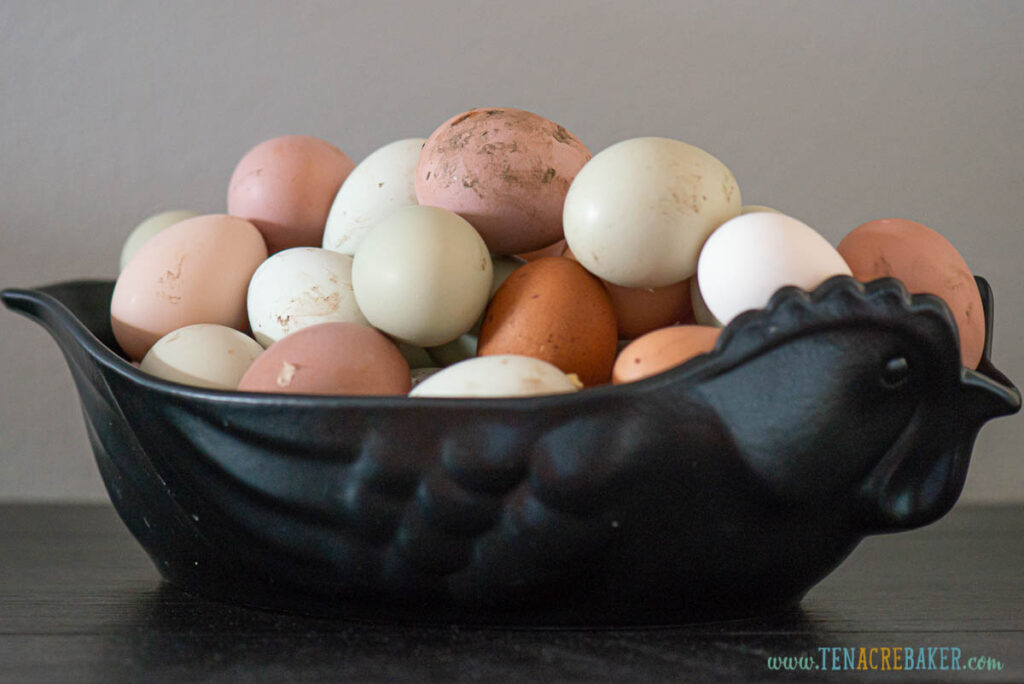
Summary: How to Keep Eggs Fresh
There is nothing quite like a fresh egg. Farm fresh eggs that have not been washed and have their protective bloom can be left out at room temperature. Store bought and washed eggs must be refrigerated. The best way to keep all eggs fresh is through refrigeration.
Egg Storage Chart
| Type of Egg | Storage Method | Use Within |
| Unwashed Farm Fresh Eggs | Room Temperature | 2-4 weeks |
| Unwashed Farm Fresh Eggs | Refrigerator | 3 months |
| Washed Farm Fresh Eggs | Refrigerator | 2 months |
| Store Bought Eggs | Refrigerator | 4-5 weeks |
| Raw Egg Whites | Refrigerator | 2-4 days |
| Raw Egg Whites | Freezer | 12 months |
| Raw Egg Yolks | Refrigerator | 2-4 days |

Angela
Love all these tips. I knew a few of them but learned something new too. Great article about eggs.
Ieva
Brilliant article! I learned so much. Had no idea that once you wash an egg it shouldn't be stored at room temperature! Thanks for all the info!
Silvia
This article was incredibly helpful! there are soooo many things I didn't know, so THANK YOU!
Michelle
Great information! We always do the sink test, even on our store bought eggs!